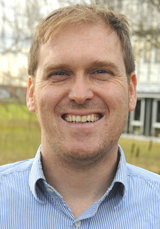Dr. Randolf Pohl has been elected Fellow of the American Physical Society (APS)
On the nomination of the Topical Group “Precision Measurement & Fundamental Constants” Dr. Randolf Pohl, leader of the ERC Research Group “Muonic Atoms” at the Max Planck Institute of Quantum Optics, Garching (near Munich), was elected Fellow of the American Physical Society (APS).
Dr. Pohl receives this award for his work on muonic hydrogen and the proton radius.

The American Physical Society was founded in 1899 and is dedicated "to advance and diffuse the knowledge of physics". Meanwhile the society has about 51 000 members worldwide and is organized in 14 divisions and 14 topical groups covering all areas of physics research. The election of APS members as Fellows follows a careful nomination and evaluation process. A fellowship represents “a distinct honor signifying recognition by one's professional peers”.
Randolf Pohl studied physics at the Technische Universität München where he received his diploma in 1997. He completed his doctoral thesis at the Swiss Federal Institute of Technology (ETH) in Zürich (Switzerland) in 2001, on the first observation of the long-lived 2S state in muonic hydrogen. From 2001 to 2005 he was working as a post-doctoral researcher at the Paul-Scherrer-Institute (PSI) in Villigen (Switzerland), aiming to measure the Lamb shift in muonic hydrogen. He then became a member of the Laser Spectroscopy Division of Professor Theodor W. Hänsch at the MPQ. Here he continued his investigation of “muonic atoms”.
In muonic hydrogen atoms, a muon replaces the electron that orbits the nucleus. Due to its 200times larger mass, the muon gets so close to the nucleus that it literally "feels" its size. In 2010, the measurements yielded a value for the proton radius which was significantly smaller than deduced from previous measurements – a fact that still puzzles the scientific community. In 2011, in the wake of this discovery, Dr. Pohl received the “European Research Council Starting Grant” which allowed him to establish his own research group “Muonic Atoms” at MPQ. Most of his effort he devotes to the CREMA project (Charge Radius Experiment with Muonic Atoms) which aims to measure the Lamb shift in muonic helium-3 and -4 ions. These experiments are carried out within a large international collaboration at PSI. The measurements will lead to a tenfold precision in the size of the nucleus, helping to solve the proton size puzzle. Dr. Pohl is one of the spokespersons of both the muonic hydrogen and the muonic helium collaboration.
Dr. Pohl jointly received the 2012 Gustav-Hertz prize of the German Physical Society. He is a member of the American, European and German Physical Societies. In 2013 he received the Francis M. Pipkin Award of the APS. Olivia Meyer-Streng
